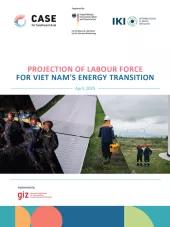This study explores how shortages of skilled workers for the energy transition could undermine global emissions pathways. Using a novel model linking labour supply and renewable energy development, it shows how labour shortages may delay renewable deployment and derail progress in power sector decarbonisation. The study also introduces the Labour Market Transition Potential Index, which consolidates labour market, demographic and institutional indicators to assess countries’ current potential to mobilise the workforce needed for the transition.
Key findings
Tripling global renewable power capacity by 2030 may require an increase from 12.5 million workers in the power generation sector in 2021 to 47 million in 2030, concentrated in manufacturing, installation and operation of renewable energy systems. The study highlights the following challenges:
- Labour shortages jeopardise progress: If only 20 to 60 percent of new labour demand is met, the world could face a shortfall of up to 6 million workers by 2030. This would delay renewable capacity expansion, leaving global renewable generation capacity nearly 10 percent below pledged targets.
- Emission impacts are significant: A slower renewable rollout would extend fossil fuel use, driving power sector emissions 12 percent above 2030 pledges and more than doubling them by 2045. This could shift the sector from a 1.7°C warming pathway toward 2.4°C, far above the Paris Agreement goal of 1.5°C.
- Labour market and demographic constraints: Ageing populations, low labour force participation and limited inward migration reduce the available pool of workers and restrict labour flexibility.
- Education and training gaps: Education and training systems are not keeping pace with demand, particularly in developing countries where infrastructure and funding remain limited.
- Slow worker transitions: Despite overlapping skill sets, transitions from fossil to renewable energy sectors remain limited due to mismatches in timing and location, insufficient retraining support and differing job characteristics.
The way forward
Countries will need to draw on new graduates, skilled migrants and worker transitions from related sectors to meet rising demand. High-income countries face challenges of ageing populations and competition for workers. Offering better wages, working conditions and career prospects is a priority for these countries. Emerging economies benefit from younger populations and wage incentives in the energy transition sectors, but face education gaps and outflows of skilled workers. Addressing these challenges requires substantial investment in training systems, institutional capacity and international cooperation to ensure sufficient skills are in place for the transition.
The preparation of this study is supported by the International Climate Initiative (IKI) on behalf of the German Federal Foreign Office. It is implemented by GIZ through the Climate Diplomacy Action Programme (CDAP).







